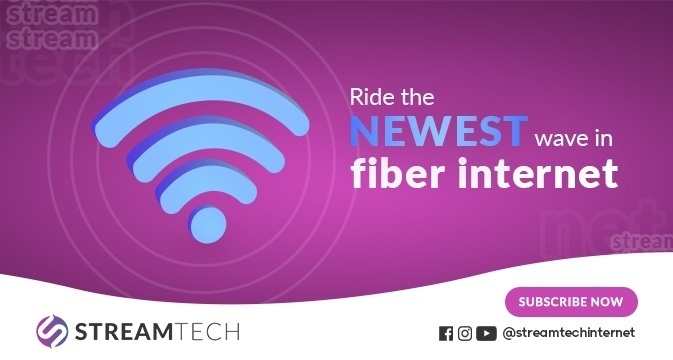Written by: Mitch De Guzman
You’ve probably heard the term “IP address” bandied about in tech and internet circles. Most people either glaze over or tune out when they hear that term. However, they are significant. Probably not in our day-to-day lives. But understanding them is critical for making the most of today’s technology, especially if you’re using fiber internet, which is becoming increasingly important.
Understanding networking fundamentals is the first step in learning about an IP address. Networking, on the other hand, is simply a method of connecting two or more devices to share data. But a network needs the former to function. Otherwise, we won’t be able to communicate or conduct any online activity, if we don’t have a virtual address.
Follow along in this article to learn why IP addresses are necessary and how you can use them to your advantage. Who can say? At the end of this post, you may have a better understanding of IP addresses.

What is an IP address?
It stands for an Internet Protocol address. Indeed, it is a unique identifier or string of numbers that your internet service provider assigns to track your online activities and location. It is an essential networking component and plays an integral role in web browsing.
Addressing is one of the fundamental aspects of networking. It is the process of assigning a unique identifier to each device on a network so that information can be routed correctly to and from them. If our devices did not have addresses, they would be unable to communicate with one another, much like if your phone didn’t have a number.
How does an IP address work?
Here’s an example of how IP addresses work. Before sending an email or surfing the web, you must connect to an internet-connected network like Gmail or Yahoo. To send an email to a destination address, you must have a fiber internet subscription from an internet service provider (ISP) like Streamtech, which will provide you with an IP address that will serve as your virtual return address.
What are the various types of IP addresses?
There are several different types of IP addresses. To avoid confusion, we’ll try to explain them as simply as possible.
Private IP address
Each device on your home network has a unique private IP address (also known as a local network or internal IP address) to make the devices communicate with one another. The IP address identifies each of these items separately. Consequently, all your gadgets (such as computers, mobile devices, smart TVs, and Bluetooth speakers) must recognize one another. For instance, you might want to cast a movie you’re watching on your phone onto your television. The network must first identify the device before you can proceed. In any case, these private addresses are hidden when you connect your devices to the internet using your router’s public IP address.
In addition, private IP addresses enable devices on the same network to communicate without connecting to the internet as a whole. That makes connecting to an external host or user more difficult, improving security within your home or company network. As a result, you can use a wireless connection to print documents from home, but your neighbor can’t.
Public IP address
A public IP address is a primary address for your entire network. While each connected device has its own IP address, they are all part of your network’s main public IP address. Your internet service provider usually assigns a public IP address to your network router, which can be accessed directly via the internet. (If you’re curious, type “What’s my IP address?” into Google.)
In addition, a public IP address is the exact same thing as an external IP address since they are both used for outgoing communications. However, only one router or network can use a public address at a time. If the address is dynamic, another router may use it after the lease expires. By the way, public IP addresses are classified into two types: dynamic and static.
Two kinds of public IP addresses

Dynamic IP address
A dynamic IP address is the one that your ISP allows you to use temporarily. In other words, it is the standard default setting provided by internet service providers and widely used on home networks. ISPs purchase a large block of IP addresses and assign one to each customer automatically. Then, they will change it periodically and recycle the old one for another customer.
Dynamic addresses can change every 24 hours to seven days in other countries. However, in most cases in the Philippines, your router will renegotiate this lease before it expires.
Static IP address
Static IP addresses are those that do not change once assigned. In short, they are stationary until the network device is deactivated. They are often more expensive than standard dynamic addresses. In most cases, web servers and other network systems that get a lot of traffic are the ones that use static IP addresses. Although they can be assigned to specific devices, they can pose security risks if not configured correctly or supported by security protocols.
Additionally, not all ISPs provide static IP addresses, and keeping your static IP address secure will require some technical knowledge.
IP Addresses for Websites
There are two types of website IP address options that you may encounter if you decide to start a website and use a web hosting service provider.
Shared IP Address
Sharing a web server with other sites is the most common hosting plan that website owners choose. However, your website will be one of the hundreds of different websites on the same server with the shared hosting plan. It may work out well for websites that don’t have a lot of visitors yet or don’t have many files or pages on the site. However, if you intend to expand your business, it is preferable to obtain a unique IP address.
Using a shared IP address has drawbacks, particularly when another website abuses it. While it is rare, there is a chance that your website will be added to the blacklist, and emails associated with your domain will end up in spam folders.
A Dedicated IP Address
A dedicated IP address serves as your domain’s web address. No other realm can use this address because it is unique to a single website.
Apart from avoiding possible blacklisting due to other users’ bad behavior on your server, it enables you to access your website solely via the IP address rather than the domain name. The good thing about this is that you can use it to build and test your website before you buy a domain name for it. Additionally, it enables you to access your website while waiting for your domain transfer.
While a dedicated IP address is no longer required, it simplifies obtaining an SSL certificate for your website. That’s important because Google places a premium on security.
And finally, a dedicated IP address lets you run your file transfer protocol (FTP) server, making sharing and transferring files with multiple people within an organization more manageable. It also allows anonymous FTP sharing.
The two versions of IP addresses
After defining the various types of IP addresses, let us examine the two distinct versions.
IPv4
Internet Protocol Version 4 is the most widespread IP address. It’s also the first version of the Internet Protocol address using a string of numbers separated by dots into four groups, known as “dotted-decimal notation.” An IPv4 address appears as follows:
87.106.214.66
Moreover, IPv4 employs a 32-bit address scheme that allows for the storage of more than 4 billion addresses.
IPv6

We now have IPv6 to prevent us from running out of IPv4 addresses. Internet Protocol Version 6 has a more comprehensive range of addresses than its predecessor. Additionally, it’s known as IPng, which stands for Internet Protocol Next Generation.
While IPv4 has a 32-bit address, IPv6 has a 128-bit address written in four hexadecimal digits. Instead of periods, it uses colons to separate the numerical and alphabetical sections of the address. Here’s how an IPv6 address will appear.
2001:4451:456a:1500:51c9:ec22: c778: de16
It will take years to complete the IPv4 to IPv6 switchover. Beside, not all networks support IPv6, and most devices still use IPv4. However, some large network providers and internet service providers (ISPs) have adopted IPv6 while keeping an alternate IPv4 address.
Virtual Private Networks (VPN)
Although VPNs are not a type of IP address, it is essential to discuss them nonetheless. A virtual private network (VPN) provides online privacy and anonymity by converting a public internet connection into a private network. A VPN hides internet protocol addresses, making your online activities virtually untraceable. Most importantly, VPN services provide greater security and encryption than even the most secure Wi-Fi network. Thus, it aids in the prevention of identity theft. So, if you are concerned about your online security and privacy, you should consider using a VPN service.
What’s a subnet mask?
A subnet mask functions similarly to the address of your internet protocol, except it is only used within a network. Routers use subnet masks to transport data packets to the correct destination. On the other hand, data packets traversing the internet do not contain subnet masks. Instead, they only have the destination IP address, which a router matches with a subnet. Subnetting can save large networks with millions of connected devices so much time by getting data faster to the correct device.
How to locate your public IP address
The simplest method is to Google your public IP address. However, it will not reveal your ISP (internet service provider) or location. Another way is by using the Windows command prompt tool. Here’s how to find your external IP address using Windows search.
1. Click the “Start” button and type “cmd.”
2. Then, in the resulting pop-up box or Command Prompt window , type nslookup myip.opendns.com resolver1.opendns.com, and press “Enter.”
Using the same steps, you can also find your wifi network address. However, instead of the previous command, type “ipconfig” in the resulting pop-up box and press Enter. The number assigned to “Default Gateway” is your router’s IP address.
Click here for a step-by-step guide to finding your home IP address.
Can a person be tracked thru their IP address?
While the addresses of your IP route internet traffic to your computer, they do not reveal your location. Someone who obtains your such may discover your ISP, but they will not be able to pinpoint your precise location.
In some cases, they may locate the city you are in or a nearby city, but they will not know your physical or home address. While strangers may not find you, your ISP knows your location. They also keep a record of your internet activity. However, they will not disclose your personal information to anyone, as they guarantee to protect you and your privacy.
There is one notable exception, tho, and it involves law enforcement. Suppose you engage in illegal activities or are subjected to cyber threats. In that case, a law enforcement agency can obtain a court order or search warrant and submit it to your ISP to get your information.
Final Thoughts
Internet browsing and website creation will not necessitate much attention to the topic of this article. However, it is always beneficial to learn about new things. You never know when your newly acquired knowledge will come in handy. So, never underestimate the value of learning something new.
If you’ve gotten this far, you’ve already gotten a leg up on the rest of the internet crowd.
Keep your personal information and privacy safe with Streamtech.

Internet service providers are responsible for ensuring internet access, routing internet traffic, resolving domain names, and maintaining the network infrastructure that enables internet access. Thus, choosing an internet service provider is crucial.
Streamtech is a leading internet service provider in the Philippines, dedicated to safeguarding your personal data and privacy. Our new wave of fiber internet provides a new level of online connectivity that goes beyond the limitations of traditional broadband, allowing you to stream, surf, and socialize without buffering or lag.
Furthermore, Streamtech recognizes the significance of online privacy and security. That’s why we want to ensure you have the protection you need. Our strict data protection policies make sure that your information is never compromised. Neither we nor any other third party will ever have access to your personal information. And as part of our commitment to keeping you safe online, we offer various security features, including firewalls, anti-virus protection, and parental controls.
Aside from affordable fiber-optic plans and fiber cable bundles, we offer our customers several payment options, including cash and credit cards, because we want to make getting the service you need as simple as possible. And with our unlimited data plans, you don’t have to worry about exceeding your limits.
When it comes to new ways of experiencing the internet, Streamtech is your best bet. Contact us today to learn more about our services. And find out how we can assist you in making the most of your internet experience. We also have a Facebook page where you can gain more information.
At Streamtech, we provide the best value for your money.









